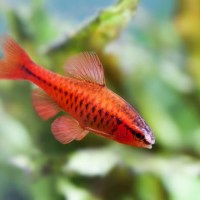Description
Flame tetras are found in South America in the coastal rivers of eastern Brazil and around Rio de Janeiro in the Guanabara bay region, Paraiba do Sul, and the Guandu River basins as well as Sao Paulo in the upper Tiete River basin. These tetras prefer slow-flowing creeks, river tributaries, and backwaters. Flame tetras were first imported to Europe in 1920 and to the United States soon afterward.
For some reason, this seemingly eternal community aquarium favorite waned in popularity over the last quarter of the 1900s and was almost rare at the turn of the millennium. Its popularity is again growing, and the Von Rio tetra can now be found at most tropical fish retailers.
Colors and Markings
This fish’s body is elongated, slightly compressed, and is shiny silver in color. Its sides are bronze to red, and its back is brilliant red as are the majority of its fins. The anal fin has a black leading edge and tip.
Tankmates
Flame tetras are extremely peaceful in nature. They are happiest in schools of six or more. Other potential tankmates for flame tetras are most of the livebearers, danios, rasboras, other tetras, and peaceful bottom dwellers.
Flame Tetra Habitat and Care
One reason flame tetras were popular was their ability to survive in temperatures as low as 64 and as high as 85 degreed Fahrenheit, while they prefer temperatures of around 72 degrees. Also, this fish accepts very low light situations; dim lighting will actually develop this fish’s best coloring.
Flame tetras prefer some plant cover and darker gravel. For the substrate, use river sand with some driftwood and twisted roots. Add some dried leaves to the sand, which will stain the water a light brown. Replace the leaves every few weeks.
Flame Tetra Diet and Feeding
Another amazing attribute of this fish is its ability to eat almost anything. Since they are omnivorous, the flame tetra will generally eat all kinds of living, fresh, and flake foods. Feed brine shrimp (either live or frozen) or blood worms as a treat. Feed this fish several times a day and only feed what this fish can consume in three minutes or less.





Reviews
There are no reviews yet.